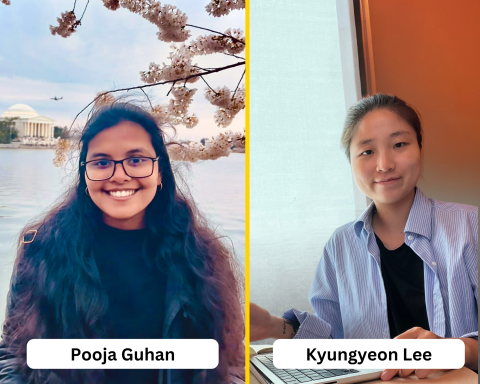Recent News & Accomplishments
2024
Pooja Guhan and Kyungyeon Lee receive the fellowship that will support their research activities.
The University of Maryland’s Graduate School has announced Department of Computer Science graduate students Pooja Guhan and Kyungyeon Lee as recipients of this year’s Summer Research Fellowship , an award designed to bolster doctoral students' research endeavors during the summer. Each student will receive a $5,000 stipend to support their projects, underscoring the university’s commitment to fostering academic research and innovation. The fellowship aims to advance doctoral students' progress toward their degrees. The research focuses of the awardees are: Pooja Guhan Pooja Guhan is a Ph.D... read more
A new study from the Computational Linguistics and Information Processing Lab reveals the risks of relying on machine translation in critical settings.
Millions of people use language translation tools daily, even if the technology—known as machine translation—is sometimes unreliable and prone to errors. While garbled translations may seem like nothing more than a minor inconvenience at times, in high-stakes settings like a hospital emergency room, an incorrect translation for discharge instructions or medication protocols could have life-threatening consequences. Researchers from the University of Maryland’s Computational Linguistics and Information Processing (CLIP) Lab looked into this problem, studying data collected from English-to-... read more
Khandelwal aims to harness AI to humanize customer support interactions.
Reaching out to customer support has often been a test of patience, marked by daunting wait times and encounters with automated systems that feel more like hurdles than helpers. Now, imagine dialing customer support and, instead of bracing for a lengthy wait, being immediately greeted by an AI bot. Not just any bot, but one that understands your query precisely and offers solutions within seconds. This scenario isn’t a glimpse into a distant future but the present reality brought to life by SynTag , a pioneering student startup from the University of Maryland’s Department of Computer Science... read more
In a Q&A session at this year's AAAS Annual Meeting, Hal Daumé III spoke about AI's role in society.
The Computing Community Consortium (CCC) supported three scientific sessions at this year’s AAAS Annual Conference and a highlight of the event was the Q&A portion of the session, “Large Language Models: Helpful Assistants, Romantic Partners or Con Artists?” This panel, moderated by Professor Maria Gini , CCC Council Member and Computer Science & Engineering professor at the University of Minnesota, featured Managing Director of AI Frontiers at Microsoft Research Ece Kamar , University of Maryland Computer Science Professor Hal Daumé III and University of Southern California Professor... read more
University of Maryland Computer Science Professor Rance Cleaveland passed away on March 27, 2024. He was also associate dean for research in the College of Computer, Mathematical, and Natural Sciences (CMNS) and held joint appointments in the University of Maryland Institute for Advanced Computer Studies and the Institute for Systems Research . Cleaveland joined UMD in 2005 and served as executive and scientific director of the Fraunhofer Center for Experimental Software Engineering from 2005 to 2014. From 2018 to 2022, he worked as director of the Division of Computing and Communication... read more
Formerly a psychology major, Addeh became a user researcher and UX team facilitator at Cambio Labs after an unexpected class redefined her academic and professional journey.
On weekends, University of Maryland alum Ogue Addeh (B.S. '16, psychology; B.S. '16, computer science) can be found gracefully moving to the rhythms of salsa, bachata and swing. But come Monday, Addeh's dance floor becomes a digital landscape where she combines her passion for psychology with the world of computer science. Addeh is a user researcher and UX team facilitator at Cambio Labs . However, her journey into the tech space was less conventional than most of her peers. Initially enrolled as a psychology major at UMD, an out-of-the-ordinary course redefined her academic and professional... read more
Katz shared insights into why these new security measures are needed and what to expect in the future.
Apple recently announced new security measures for its iMessage app that is used by more than a billion people worldwide. In unveiling its PQ3 post-quantum cryptographic protocol , Apple said it is taking action now—while quantum computing is still in its nascent stage—to prevent hackers from collecting current iMessage data, and then using that information in the future when quantum computers are more readily available. In the security world, this scenario is known as Harvest Now, Decrypt Later. We sat down with Jonathan Katz , a University of Maryland expert on quantum-secure cryptography,... read more
The computer science and psychology double major interned at Microsoft through Breakthrough Tech DC’s winter 2024 ‘Sprinternship’ program.
Bennett Sellers, a sophomore psychology and computer science double major, spent the 2023-2024 winter break interning with Microsoft through the Breakthrough Tech D.C. Sprinternship program— a program that pairs University of Maryland and George Mason University students with tech companies for paid, three-week micro-internship opportunities. Sellers said he was surprised and excited to find that he’d been accepted into the program, which he heard about through an extracurricular interest: Sellers, the treasurer of the Maryland Club Swim Team, learned about the program through a colleague he... read more
Plane was recognized for her three decades of work advancing diversity and computing education.
Jandelyn "Jan" Plane , a principal lecturer emerita of computer science at the University of Maryland, has been awarded the 2024 Award for Broadening Participation in Computing Education by the Association for Computing Machinery's Special Interest Group on Computer Science Education (ACM SIGCSE). This honor recognizes her significant contributions to the computer science education community, especially in enhancing diversity and access in the field. The award will be presented in Portland, Oregon, from March 20-23, 2024. Initiated in 2024, the ACM SIGCSE Award for Broadening Participation in... read more
Manocha was recognized for his significant contributions to the field of virtual reality.
Distinguished University Professor Dinesh Manocha has been inducted into the IEEE VGTC Virtual Reality Academy in recognition of his fundamental contributions to virtual reality . His work, spanning research and services, aligns with the academy's goal of acknowledging individuals who have profoundly impacted virtual reality through their professional endeavors. Manocha is among a select group of only five other distinguished inductees this year, and his induction into the IEEE VGTC Virtual Reality Academy underscores his profound impact on the field. Established in 2022, the academy serves... read more









